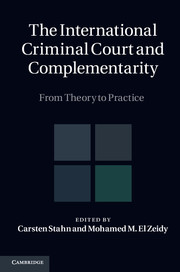Book contents
- Frontmatter
- Contents
- Acknowledgments
- Foreword by HE Judge Sang-Hyun Song
- Foreword by Patricia O’Brien
- Foreword by Silvia A. Fernandez de Gurmendi
- List of abbreviations
- Introduction: bridge over troubled waters?
- PART I General reflections
- PART II Origin and genesis of complementarity
- PART III Analytical dimensions of complementarity
- 7 Complementarity as global governance
- 8 Policy through complementarity: the atrocity trial as justice
- 9 Taking complementarity seriously
- 10 International criminal justice in the era of failed states: the ICC and the self-referral debate
- 11 The quest for constructive complementarity
- 12 Reframing positive complementarity
- 13 Too much of a good thing?: implementation and the uses of complementarity
- PART IV Interpretation and application
- PART IV (Continued) Interpretation and application
- PART V Complementarity in perspective
- PART VI Complementarity in practice
- Index
- References
10 - International criminal justice in the era of failed states: the ICC and the self-referral debate
from PART III - Analytical dimensions of complementarity
Published online by Cambridge University Press: 05 November 2014
- Frontmatter
- Contents
- Acknowledgments
- Foreword by HE Judge Sang-Hyun Song
- Foreword by Patricia O’Brien
- Foreword by Silvia A. Fernandez de Gurmendi
- List of abbreviations
- Introduction: bridge over troubled waters?
- PART I General reflections
- PART II Origin and genesis of complementarity
- PART III Analytical dimensions of complementarity
- 7 Complementarity as global governance
- 8 Policy through complementarity: the atrocity trial as justice
- 9 Taking complementarity seriously
- 10 International criminal justice in the era of failed states: the ICC and the self-referral debate
- 11 The quest for constructive complementarity
- 12 Reframing positive complementarity
- 13 Too much of a good thing?: implementation and the uses of complementarity
- PART IV Interpretation and application
- PART IV (Continued) Interpretation and application
- PART V Complementarity in perspective
- PART VI Complementarity in practice
- Index
- References
Summary
At the inception of the UN Charter era, the abominable excesses of totalitarian states in the Second World War prompted international jurists to create coercive global regimes to guard against the abuse of sovereign powers. In the post-Cold War era, however, a new challenge has emerged. The contemporary world is faced with an unprecedented incidence of fragile or failed states besieged by powerful insurgencies or criminal organizations. Where states were once assumed to be the villains in the human rights narrative, they are now often all that stands between a civilian population and a non-state group determined to commit massive human rights atrocities. The consequences of this new reality are reflected in the debate over the right of states to make ‘self-referrals’ under Article 14 of the Rome Statute of the International Criminal Court. Article 14 allows a State Party to refer a situation, including crimes committed within the state's own jurisdiction, to the ICC Office of the Prosecutor for investigation. Since the Statute's inception, the self-referral mechanism has been the subject of considerable controversy among jurists. Some have argued that self-referrals are inconsistent with the independence of the Court and its complementarity scheme. However, recent developments demonstrate that a mutuality of objectives between the Court and fragile states exists when confronting large-scale atrocities by non-state actors. There is no reason why ICC enforcement cannot be variously cooperative and coercive vis-à-vis states, depending on the circumstances. The self-referral mechanism of the Rome Statute, when used judiciously, should thus be seen both as a useful weapon in the battle against impunity and a life-line for fragile states.
Introduction
International criminal law emerged from the crucible of the Second World War as a response to the abominable excesses of totalitarian states. At the inception of the UN Charter era, this anti-state worldview prompted international jurists to create coercive global regimes to guard against the abuse of sovereign powers. Despite the promises of the Nuremberg Charter, in the years that followed states continued to be the omnipotent villain as millions became victims of atrocities. In the post-Cold War era, however, a new challenge has emerged.
- Type
- Chapter
- Information
- The International Criminal Court and ComplementarityFrom Theory to Practice, pp. 283 - 303Publisher: Cambridge University PressPrint publication year: 2011
References
- 2
- Cited by

